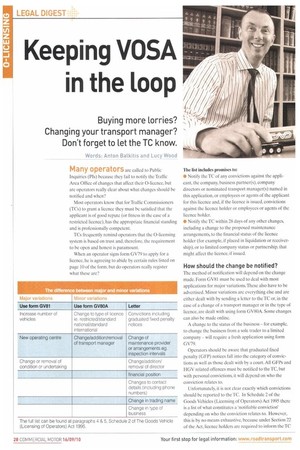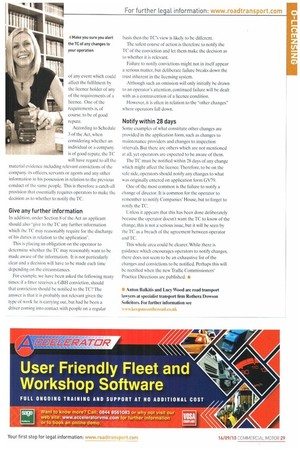Keeping VOSA in the loop
Page 28

Page 29

If you've noticed an error in this article please click here to report it so we can fix it.
Buying more lorries?
Changing your transport manager? Don't forget to let the TC know.
Words: Anton Balkitis and Lucy Wood
Many operators are called to Public Inquiries (PIs) because they fail to notify the Traffic Area Office of changes that affect their 0-licence, but are operators really clear about what changes should be notified and when?
Most operators know that for Traffic Commissioners (TCs) to grant a licence they must be satisfied that the applicant is of good repute (or fitness in the case of a restricted licence), has the appropriate financial standing and is professionally competent_ TCs frequently remind operators that the 0-licensing system is based on trust and, therefore, the requirement to be open and honest is paramount.
When an operator signs form GV79 to apply for a licence, he is agreeing to abide by certain rules listed on page 10 of the form, but do operators really register what these are? The list includes promises to: • Notify the TC of any convictions against the applicant, the company, business partner(s), company directors or nominated transport manager(s) named in this application, or employees or agents of the applicant for this licence and, if the licence is issued, convictions against the licence holder or employees or agents of the licence holder.
• Notify the TC within 28 days of any other changes, including a change to the proposed maintenance arrangements, to the financial status of the licence holder (for example, if placed in liquidation or receivership), or to limited company status or partnership, that might affect the licence, if issued.
How should the change be notified?
The method of notification will depend on the change made. Form G V81 must be used to deal with most applications for major variations. These also have to be advertised. Minor variations are everything else and are either dealt with by sending a letter to the TC or, in the case of a change of a transport manager or in the type of licence, are dealt with using form GV80A. Some changes can also be made online.
A change to the status of the business for example, to change the business from a sole trader to a limited company will require a fresh application using form GV79.
Operators should be aware that graduated fixed penalty (GFP) notices fall into the category of convictions as well as those dealt with by a court. All GFPs and HGV related offences must be notified to the TC, but with personal convictions, it will depend on who the conviction relates to Unfortunately, it is not clear exactly which convictions should be reported to the TC. In Schedule 2 of the Goods Vehicles (Licensing of Operators) Act 1995 there is a list of what constitutes a 'notifiable conviction' depending on who the conviction relates to. However, this is by no means exhaustive, because under Section 22 of the Act, licence holders are required to inform the TC
of any event which could affect the fulfilment by the licence holder of an■., of the requirements of a licence. One of the requirements is, of course, to be of good repute.
According to Schedule 3 of the Act, when considering whether an individual or a company is of good repute, the TC will have regard to all the material evidence including relevant convictions of the company, its officers, servants or agents and any other information in his possession in relation to the previous conduct of the same people. This is therefore a catch-all provision that essentially requires operators to make the decision as to whether to notify the TC.
Give any further information
In addition, under Section 8 of the Act an applicant should also "give to the TC any further information which the TC may reasonably require for the discharge of his duties in relation to the application".
This is placing an obligation on the operator to determine whether the TC may reasonably want to be made aware of the information. It is not particularly clear and a decision will have to be made each time depending on the circumstances.
For example, we have been asked the following many times: if a fitter receives a GBH conviction, should that conviction should be notified to the TC? The answer is that it is probably not relevant given the type of work he is carrying out, but had he been a driver coming into contact with people on a regular basis then the TC's view is likely to be different.
The safest course of action is therefore to notify the TC of the conviction and let them make the decision as to whether it is relevant.
Failure to notify convictions might not in itself appear a serious matter, but deliberate failure breaks down the trust inherent in the licensing system.
Although such an omission will only initially be drawn to an operator's attention, continued failure will be dealt with as a contravention of a licence condition.
However, it is often in relation to the -other changes" where operators fall down.
Notify within 28 days
Some examples of what constitute other changes are provided in the application form, such as changes to maintenance providers and changes to inspection intervals. But there are others which are not mentioned at all, yet operators are expected to be aware of them.
The TC must be notified within 28 days of any change which might affect the licence. Therefore, to be on the safe side, operators should notify any changes to what was originally entered on application form 0V79.
One of the most common is the failure to notify a change of director. It is common for the operator to remember to notify Companies' House, but to forget to notify the TC.
Unless it appears that this has been done deliberately because the operator doesn't want the TC to know of the change, this is not a serious issue, but it will be seen by the TC as a breach of the agreement between operator and TC.
This whole area could be clearer. While there is guidance which encourages operators to notify changes, there does not seem to be an exhaustive list of the changes and convictions to be notified. Perhaps this will be rectified when the new Traffic Commissioners' Practice Directions are published. • 0 Anton Balkitis and Lucy Wood are road transport lawyers at specialist transport firm Rothera Dowson Solicitors. For further information see w e pmeo n then oad.com k




























































































































